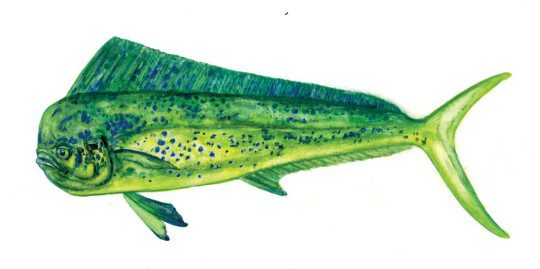

Mahi mahi can be safely fed to dogs in minimal portions. Mahi mahi has lean proteins and contains omega-3 fatty acids, essential for a dog’s heart health, as well as vitamins B3, B5, B6, and B12. The fish is also rich in potassium and selenium, which support nerve and muscle functions in dogs and boost their immune system. While relatively low in mercury, mahi mahi should not be served in large amounts and may contain bacteria and parasites. Additionally, the fish bones of mahi mahi can present a choking hazard.
Dogs can enjoy the benefits of mahi mahi, such as its lean protein and essential omega-3 fatty acids for heart health, as well as vitamins B3, B5, B6, and B12 for nerve and blood health. The fish is also a great source of potassium and selenium, which support nerve and muscle functions in dogs and boost their immune system.
Mahi mahi has low to moderate mercury levels, and should not be served in large amounts which could lead to mercury poisoning. The fish also may contain bacteria and parasites, and the fish bones could be a choking hazard.
Debone the mahi mahi, cook the fillet thoroughly, and ensure it is adequately cooled before being fed to your pet. Mahi mahi should be given to your dog occasionally in moderation.
Mahi mahi, also known as common dolphinfish or dorado, is a saltwater fish found in tropical and subtropical waters. It generally originates from Hawaii and is served widely in restaurants around the world. This type of fish can also be beneficial to your canine companion if fed in controlled portions.
Mahi mahi offers lean proteins and contains essential fatty acids such as omega-3 that are beneficial for heart health, as well as vitamins B3, B5, B6, and B12. This fish is also rich in two minerals – potassium and selenium – which are great for nerve and muscle functions and boosting your pup’s immune system. However, it should not be served in large portions, as it may contain increased levels of mercury, and the fish bones can present a choking hazard.
It is best to debone the mahi mahi before cooking it thoroughly and ensuring it is adequately cooled before feeding it to your pup. Mahi mahi should be given to your dog occasionally and in moderation. If you’re looking for fish-based alternatives, you can consider cooked salmon, which has fewer calories than mahi mahi and healthier fats. Alternatively, cooked whitefish such as cod, whiting, haddock, and pollock can also be included in a balanced diet for your pup.
You may be wondering if the omega-3 fatty acids in mahi mahi are the same as those from other sources such as fish oil supplements. The answer is yes, all sources of omega-3 fatty acids (EPA, DHA, ALA, etc) ultimately benefit your dog’s health in the same way.
Have you ever fed mahi mahi to your pup? How was their experience?
Ultimately, adding ingredients like mahi mahi to your pup's diet can be a great idea to diversify their meals and provide them with valuable nutrients. Make sure to talk to your vet about the exact portions recommended for your doggo, as all doggos are unique and may differ in nutritional needs. All the best to you and your pup, we hope you enjoy the healthy benefits of mahi mahi!